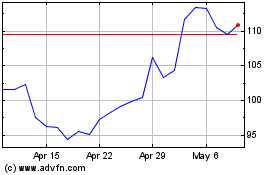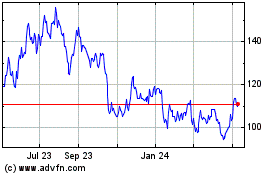Baidu Chief Scientist Andrew Ng Exits Chinese Internet Giant -- Update
March 22 2017 - 7:21AM
Dow Jones News
By Liza Lin
As Baidu Inc. accelerates efforts to expand its
artificial-intelligence capacities, it is losing one of its
brightest stars.
Baidu chief scientist Andrew Ng said Wednesday that he was
leaving the company to explore "a new chapter" in artificial
intelligence, without providing details. In a statement posted
online, Mr. Ng said he had been "privileged to learn from both the
U.S. and Chinese AI communities--both of which are
powerhouses."
"The U.S. is very good at inventing new technology ideas," he
said. "China is very good at inventing and quickly shipping AI
products. I'm happy also to have had an opportunity to contribute
to the rise of AI in both China and the U.S."
A Stanford University adjunct professor, Mr. Ng was brought on
to help the Chinese search-engine firm build out its
artificial-intelligence capabilities. He headed four Baidu research
labs, including one in Silicon Valley and Baidu's big-data and
speech-technology groups. He split his time between Beijing and
Sunnyvale, Calif.
"This is a big blow to Baidu's strategy on artificial
intelligence and a setback of the company's internationalization,"
said Fang Xingdong, founder of internet strategy think tank
Chinalabs.
Mr. Ng's departure comes two months after the firm hired Qi Lu ,
a former top executive with Microsoft Corp., to oversee key
business units. Baidu said on its social-media platforms that Mr.
Ng's departure was a loss, but that it was grateful for his
contributions.
"Hey Andrew, our friendship lasts as long as the world endures,"
Baidu said.
A person familiar with Mr. Ng's plans said he isn't in talks to
join a major tech company or a Baidu competitor, but plans to
continue working in artificial intelligence. Those plans might
include launching a startup or focusing on research, this person
said.
Mr. Ng's departure comes as the Beijing-based firm is
strengthening its focus on artificial intelligence. Facing
increasing competition from domestic rivals Alibaba Group Holding
Ltd. and Tencent Holdings Ltd., Baidu has said it would be focusing
on its core strengths of machine learning and autonomous driving.
Chairman Robin Li is seeking to use big data and such technologies
to make its offerings more efficient.
Mr. Ng's 2014 hiring was considered a major coup for the Chinese
internet giant, whose main business is search. Before joining
Baidu, he led Google Brain, Google's deep-learning research
project, and co-founded the Coursera online-education company. The
40-year-old grew up in Hong Kong and Singapore, and holds degrees
from the Massachusetts Institute of Technology and University of
California, Berkeley.
Baidu needs to be more ambitious in its international expansion
and expand its market share in the U.S. to retain high-level
talent, Mr. Fang said.
Considered part of China's trio of internet titans together with
e-commerce company Alibaba and social-networking firm Tencent,
Baidu has seen its influence and market valuation slip in recent
years. Alibaba and Tencent, once operating in separate areas of the
internet, are starting to grow their investments in similar
technologies.
Baidu named Vice President Wang Haifeng as the new head of its
AI group to succeed Mr. Ng. Mr. Wang, a former president of the
Association for Computational Linguistics, has been with Baidu
since 2010.
He is also the department chair at Peking University's
department for language information engineering. He was previously
chief research scientist at Toshiba China R&D Center and held
an assistant researcher position at Microsoft.
Yang Jie contributed to this article.
Write to Liza Lin at Liza.Lin@wsj.com
(END) Dow Jones Newswires
March 22, 2017 08:06 ET (12:06 GMT)
Copyright (c) 2017 Dow Jones & Company, Inc.
Baidu (NASDAQ:BIDU)
Historical Stock Chart
From Mar 2024 to Apr 2024

Baidu (NASDAQ:BIDU)
Historical Stock Chart
From Apr 2023 to Apr 2024
